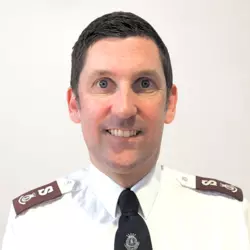18 May 2024
The Holy Spirit
Major Matt Butler
Major Matt Butler invites us to receive and discover God’s amazing gift for each believer.
Key text
What was the last thing you received? Was it expected or unexpected? We may remember waiting for our birthdays as children, wondering what we might receive and who it is from.
Our study passage takes us to Acts. Still in grief and bewilderment, the disciples are gathered in fearful obedience in Jerusalem. It has been 50 days since Jesus’ death and resurrection. During that time, their initial grief has been countered by their encounters with Jesus, who spoke peace, power and purpose over them.
Their time of waiting concludes at Pentecost with the birth of the Church. What the believers receive exceeds their expectations. They can speak other languages and boldly share the good news as they address crowds. By receiving, they are emboldened.
Pause and reflect
- Think of a time when what you received exceeded your expectations.
- Think of a time when you received something less than or different from what you expected.
- Do our expectations depend upon who the giver is?
Jesus tells us that God will send the Holy Spirit (see John 14:26). Scripture tells us that God is a good giver (see Matthew 7:9–11 and Philippians 4:19). Therefore, the gift of the Holy Spirit is a good gift. It is not something to be afraid of, or something we should feel unable to receive.
We can believe that the Holy Spirit is real and for us, as it was promised. Luke, the writer of Acts, records how Peter makes it clear that what happens to the disciples in front of the cosmopolitan crowd was prophesied long ago. He reminds us that the prophet Joel had said this would happen (see Joel 2:28–32). John the Baptist also spoke about one who would come and ‘baptise you with the Holy Spirit and fire’ (Luke 3:16).
When do we receive the Holy Spirit? In Acts 2, we find God’s perfect timing. The disciples are together. They are in need of something beyond themselves. The city is full of people from throughout the Jewish world, so the message could be taken far and wide.
Have you ever been asked if you have received, or been baptised in, the Holy Spirit? There can be a danger that we think this happens at some point after our salvation – once we have sorted a few things out, or attended church long enough, or are holy or worthy enough. However, the Bible teaches us that coming to faith and receiving the Holy Spirit are not two separate events. We are taught that without the Holy Spirit we don’t belong to Christ (see Romans 8:9) and that ‘when you believed, you were marked in him with a seal, the promised Holy Spirit’ (Ephesians 1:13).
In addition, receiving the Holy Spirit is not just a once-for-all-time offer. Throughout our lives, we can continually receive a fresh infilling of the Holy Spirit – we just need to ask.
Pause and reflect
- Have you ever felt ‘holy’ enough to receive the Holy Spirit?
- When did you last ask to receive the Holy Spirit?
- What examples do you have of God’s perfect timing in receiving the Holy Spirit?
The events of Acts 2 and beyond, and the testimony of believers to this day, highlight that receiving the Holy Spirit leads to transformation. Pentecost is recorded in Acts 2, but the whole of this book could be named ‘The Acts of the Holy Spirit’ as it captures the early Church being led and shaped by the Holy Spirit.
We recognise that the Holy Spirit has the ability to change lives. Peter is transformed from someone who denies knowing Jesus three times to being a bold leader. Saul is transformed from an ardent persecutor of early Christians to Paul, a messenger of Jesus.
We also see healings in Acts 3:1–8, noticeable generosity in Acts 4:32, Gentiles finding salvation in Jesus and receiving the Holy Spirit in Acts 10:44, and miracles such as the prison break in Acts 16:25 and 26. Through an initial small group of scared believers, who are transformed by receiving the Holy Spirit, churches are planted in multiple towns and cities across the surrounding region and countries.
We can be overwhelmed by the dramatic events of the Holy Spirit at work, as outlined above, and think that they are not for us. However, through our 20 years in ministry as officers, my wife, Sarah, and I can testify to the impact of individuals receiving the Holy Spirit – physical acts in worship, tongues spoken in praise and prayer, healing, receiving peace in a moment of distress, a sense of calling, reconciliation and forgiveness, recovery from addiction. I could go on.
Once received, the Holy Spirit desires to be used. Think back to Christmases and birthdays gone by. How many gifts have you used well? How many remain in a drawer unused? A bit like a muscle, the more we allow him freedom to work, the stronger we get in recognising God working in and through us. We then experience more of him as Comforter, Counsellor and Advocate, and know the peace he brings. We become bolder in being witnesses just as Jesus promised in Acts 1:8. We become more attuned to his promptings. We become more aware of our own spiritual rebirth and transformation into Christlikeness.
This Pentecost, I pray that you will know what it is to ask and receive the Holy Spirit.
Pause and reflect
- Where do you see the work of the Holy Spirit in your corps?
- How might your corps look if every believer asked for a fresh outpouring of the Spirit?
Bible study by

Major Matt Butler
Corps Officer, Bognor Regis
Discover more

Major Malcolm Martin reviews Holiness Ablaze! by General Shaw Clifton (Retired).

Major Matt Butler highlights those who bring correction and challenge to God’s people.


